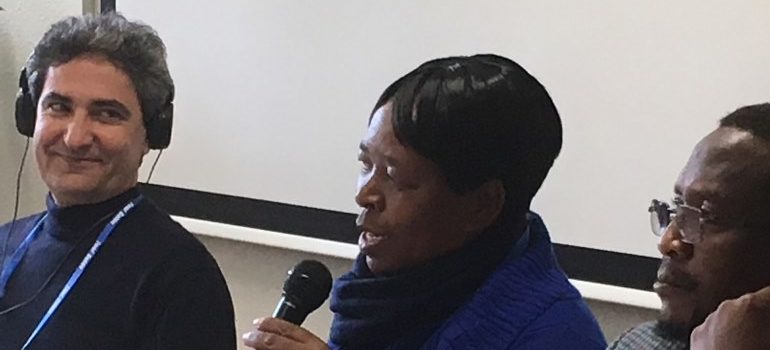
The third session of the Intergovernmental Working Group on the Rights of Peasants and Other People Working in Rural Areas was held in May in Geneva. The CETIM was present with a major delegation of peasants from La Vía Campesina (LVC) and other organizations of fishers, shepherds, nomads, foresters, indigenous peoples and social organizations.
The adoption by the United Nations of a declaration on the rights of peasants and other people working in rural areas is a historic LVC project, impelled by the necessity of protecting peasants’ rights from the ravages of the neo-liberal system. The CETIM and FIAN International, as organizations committed to the defense of peoples fighting for their rights, are supporting and aiding this campaign. The goal is to have the United Nations adopt international norms protecting these actors essential to food sovereignty, the fight against climate change and biodiversity conservation.
In September 2012, the Human Rights Council set up an intergovernmental working group mandated to draft and adopt a declaration on the rights of peasants and other people working in rural areas.
Since first two sessions of the Working Group (July 2013 and February 2015), the project has made considerable progress. The draft declaration revised in February 2015 effectively included the majority of the proposals formulated by the peasants and other persons working in rural areas.
The third session was held under the direction of the chair-rapporteur of the Working Group, the new Bolivian ambassador, Nardi Suxo Iturre, replacing Angélica Navarro Llnaos.
The session opened by a panel discussion by Sue Longley (International Union of Food and Agricultural Workers), Elizabeth Mpofu (LVC Secretary General), Sofia Monsalve (FIAN International) and Sangeeta Shashikant (Third World Network). The panel tackled several basic points of the declaration: social security for peasants, the right to seed and to biodiversity and states’ obligations.
The the discussions dealt with the blocks of five articles. Contrary what had happened at the first two sessions, countries that had been hesitant about the process (in particular the countries of the European Union) participated constructively. This new attitude can be attributed primarily to the mobilization work of the peasants and the support movements in these countries. Nonetheless, fundamental divergences persist among some of the EU countries. It should be noted that, in the absence of a common European position, the Netherlands delegate, in his capacity of coordinator for the EU and representing the EU hard line, felt free to insist on several points. For example, the delegate continued to refuse the word peasants, in his opinion an inadequate term. Further, he expressed reservations on the articles of the declaration that “ignore the reality of the market economy”. In other words, for this delegate, the articles calling into question free trade, the interests of the European powers and their economic and political élites and their corporations should be amended or removed. The EU in particular affirmed that it would under no condition accept Articles 19 through 24, to wit the new rights sought by the peasants, such as the right to land, to means of production, to seeds, to biodiversity. The United States, for their part, continued to oppose the project of a declaration, questioning its real necessity.
The representatives of millions peasants, grouped within a single joint delegation of LVC, ROPPA, FIMARC and other food producers (such as fishers and nomads) provided an attentive and assiduous participation throughout the session. In all, more than 60 oral interventions were made in the course of the negotiations. Owing to these interventions, the peasant delegates were able to make their voices and their demands heard. The accent was on six aspects in particular that constitute – for the peasants – the backbone of the declaration: the right to land, to seeds, to biodiversity, to means of production, states’ obligations and access to justice for the victims. A parallel conference devoted to these themes, organized by the CETIM, FIAN International and LVC, was held at mid-week, followed by a public conference in town in Geneva.
As has been the case since the beginning of the process, the LVC delegation was supported by the CETIM’s expertise, in both logistics and in overall preparation of the session.
In the course of the coming month, the Working Group’s chair-rapporteur, after consultations, willpropose an updated version of the draft declaration, based on discussionsheld during the third session. This new version will be presented to the Working Group’s fourth session in 2017.